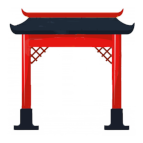| Meaning |

hard, strong 固
|
| Explanation |
|
Used in these characters:
|
|
固
|
 |
|
JLPT HSK 5 |
|
| hard, strong, solid, undoubtedly
|
Outside frame 囗, but here: mouth 口, inside: old 古 (= tomb stone). [Some things like the meat of old animals or full-grown vegetable becomes hard with age.]
In the mouth old things taste: hard. [In contrast: In the mouth 口 have young things (= this is "not yet 未") a special taste 味]

|
|
|
|
涸
|
 |
|
JLPT no HSK |
|
| to dry, to dry up
|
Left: water 氵, right: hard, solid 固 (Many things 囗 [i.e. vegetable, roots] with age 古 get hard.)
(In respect to) the water sth. became hard/rigid, because it dried up.

|
|
|
|
锢
|
 |
|
JLPT no HSK |
|
| restrain, to stop, obstinate disease
|
Left: metal 钅, right: hard, solid 固 (Many things 囗 [i.e. vegetable, roots] with age 古 get hard.)
As metal is hard, it can restrain.

|
|
|
| Radicals are shown here that are similar either in appearance or meaning. |  |
|
At the page you get the memory phrases for learning the Chinese Hanzi. If you are learning the Japanese kanji, please follow this link. |
List of the characters |
List of the radicals
|

